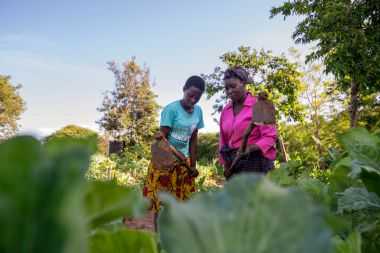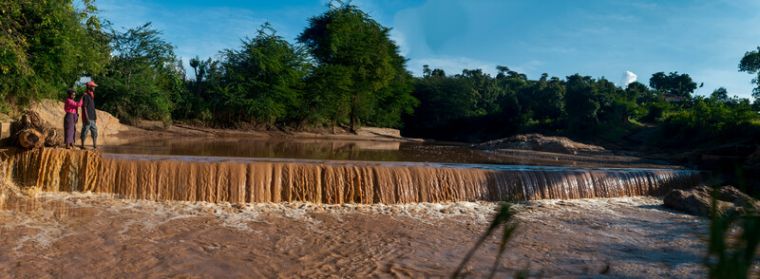Releasing children from poverty also means taking steps now to care for our planet

Great Big Green Week (18-26 September) is the largest event for climate and nature ever seen in the UK, with thousands of communities, organisations and charities celebrating action on climate change. Child development charity Compassion UK is among these charities. Palamanga Ouali, the Compassion Vice President for Africa, highlights the disproportionate impact climate change has on the youngest around the world and the role grassroot projects play in helping combat these effects.
A recent report from UNICEF makes it clear that the climate crisis is also a crisis for children's rights: "Almost every child on earth is exposed to at least one climate and environmental hazard, shock or stress such as heatwaves, cyclones, air pollution, flooding and water scarcity."
Children are more physically and psychologically vulnerable than adults to the effects of climate change, biodiversity loss, and increasing levels of pollution in the air, soil, water and oceans. And they face a difficult future as "any deprivation as a result of climate and environmental degradation at a young age can result in a lifetime of lost opportunity."
As a member of my community in Burkina Faso, and as Compassion Vice President for Africa, I can attest that we cannot deliver on our mission to release children from poverty in Jesus' name unless we also accept and act on the biblical mandate to care for the integrity of God's creation.
This mandate ensures all children can grow up in environments that provide them secure and sustainable access to the basic essentials of life, such as food, water and energy. UNICEF's Children Climate Risk Index, has shown us that children are at a high or extremely high risk of the impacts of climate change in 70% of the countries Compassion works in.
Burkina Faso is one of these countries. In Tougan, there is a race against time with decreasing rainfall and the damaging effects of the hot winds from the Sahara Desert. The wind erodes and dries out the unprotected soil, making farming impossible. Without food, people are forced to move to the cities to find work.
It's not the threat of a future catastrophe people face, but the very real and immediate impact of a changing climate.
In response, the people of Tougan are planting trees, which protect the soil from the wind and helping to retain moisture in this rain parched section of Africa. Trees act as windbreaks and help restore the local ecosystem, providing a natural solution to failing crops, faltered livelihoods, and desolate communities.
These sorts of innovations are crucial. Not just for Tougan, Burkina Faso, but right across the globe.
Tackling the existential threat of climate change can feel like an impossible feat, but as leading Climate Scientist Dr Kate Marvel says, we don't have hope we can slow climate change, we have something better – certainty.
Certainty that we have the knowledge, tools and technology we need to make a difference, to protect our children now and safeguard future generations. Technology like the natural wind barrier in Tougan, Burkina Faso, is part of a suite of sustainable land management practises that Compassion is currently undertaking with our church partners. But it isn't the only place we have seen interventions successfully combat the impact of climate change.
For years, Lilian who lives in semi-arid Kitui, Kenya, had tried to venture into commercial vegetable farming. Prolonged periods of drought have seen children go hungry and families rely on hand outs and the kindness of others just to survive. The unpredictable weather patterns and persistent drought made Lilian's ambition an impossible undertaking. But this changed when Compassion's local church partner was able to build a sand dam for the community.

A sand dam is a wall built across a seasonal riverbed. During the rainy season, when the river runs, heavy sand accumulates behind the dam. Within a few rainy seasons, the dam fills with sand, but up to 40 percent of the volume held behind the wall is water stored between grains of sand.
This innovative solution to water shortages transforms environments beyond recognition.
The sand dam has raised the water table in Kitui allowing wells to provide water. These days, with her 16-year-old daughter Merrium, who is supported in her education and health through Compassion, Lilian carefully tends to her garden where she grows maize, tomatoes, spinach, and peppers to eat and sell.
These two instances alone highlight the crucial nature of local projects, specific to their geographical context to combat climate change and its impact on the youngest and most vulnerable. There is an old African proverb. "The wind does not break a tree that bends." If we do not adapt to our changing circumstances, we will break. Local communities like ours are adapting and innovating as the climate shifts around them.
Far from being the victims of circumstance, we are also seeing children making a stand to protect the environment God has entrusted to us. In Indonesia, a teacher and graduate of Compassion's program is giving back to her community through a waste collection and recycling programme that involves the children. As well as serving their community, the children and young people play a vital role in protecting their local environment and are learning skills for green jobs in the future.
As Christians we wait with hope for the future. We pray that our world leaders to make wise decisions to protect the planet. But we also need to act with certainty now – every community must reduce our carbon footprints, mitigate climate change and help those already impacted to adapt and become resilient to its effects. We must continue to bend and adapt to the winds of change for the sake of every child, born and unborn, so that they may live in safety and thrive.
Palamanga Ouali was born in Burkina Faso. He has worked in the Development sector for 20 years, including working for the United Nations Development Program (UNDP) and has a Masters in Development Economics and Development Planning. Palamanga was named Vice President of the African Region of Compassion International in July of 2019 and is based in Burkina Faso. Prior to this, Palamanga served as the Regional Field Director of Kenya for nearly 3 years, after serving as both country director and senior regional director for Burkina Faso for close to 10 years. The African region has approximately 673 staff in eight countries. The work that Palamanga and Compassion International staff do directly impact 960,103 registered children in more than 3,400 projects throughout the region.











